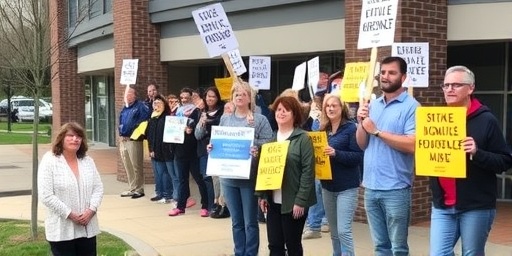In a resounding show of unity, 150 essential healthcare workers at Geisinger-Lewistown Hospital in Pennsylvania have voted overwhelmingly to authorize a Healthcare strike, protesting low wages starting at just $15.25 an hour that they say trap them in poverty. The vote, which passed with 98% approval, comes as represented by SEIU Healthcare Pennsylvania, the workers prepare for renewed contract talks on December 2, 2025, following a planned Thanksgiving rally on November 25 to amplify their demands for fair pay.
- 98% Strike Vote Exposes Breaking Point for Frontline Staff
- Poverty-Level Pay Strains Families and Forces Second Jobs
- SEIU Cites Kaiser Permanente Strike Lessons in Geisinger Push
- Thanksgiving Rally Ramps Up Pressure Ahead of Key Talks
- Strike Threat Looms: Risks to Patients, Economy, and Geisinger’s Reputation
98% Strike Vote Exposes Breaking Point for Frontline Staff
The authorization vote, held last week, underscores the mounting desperation among a diverse group of hospital employees including certified nursing assistants (CNAs), dietary aides, housekeeping staff, and maintenance workers. These roles form the backbone of patient care at the 123-bed facility in Mifflin County, yet many earn wages that fall well below a living wage in central Pennsylvania.
“We’ve been patient for too long,” said Maria Gonzalez, a CNA with five years at Geisinger-Lewistown who earns $16.10 per hour. “I work 40 hours a week, sometimes more with overtime, and still qualify for food stamps. How can I afford rent, childcare, or even gas to get here? This Healthcare strike authorization is our last resort.”
Union leaders report that the ballot saw near-unanimous support, with only three votes against out of 153 eligible workers. This level of solidarity is rare and signals that previous negotiation rounds have yielded little progress. SEIU officials noted that Geisinger, a major nonprofit health system serving over 3 million patients across Pennsylvania and New Jersey, has offered raises averaging just 2-3% annually, far below inflation rates hovering around 3-4% and the escalating cost of living.
Geisinger-Lewistown, part of the larger Geisinger Health network, reported revenues exceeding $6 billion system-wide in its latest fiscal year. Critics argue this financial strength should translate to better compensation for low-wage workers, especially as executive salaries at the top exceed $1 million for some leaders.
Poverty-Level Pay Strains Families and Forces Second Jobs
The core grievance revolves around low wages that render basic necessities unattainable. At $15.25 per hour—the starting rate for many entry-level positions—full-time workers gross about $31,720 annually before taxes. According to MIT’s Living Wage Calculator, a single adult in Mifflin County needs $17.23 per hour to cover essentials without government assistance, while a family of four with one child requires $28.62.
- Rent averages $900/month in the area, consuming over 30% of take-home pay for many.
- Grocery costs have surged 25% since 2020, per U.S. Bureau of Labor Statistics data.
- Healthcare premiums , ironically, deduct another 5-10% from paychecks, even for Geisinger employees.
Personal stories paint a vivid picture of hardship. Jamal Thompson, a housekeeping aide and father of two, shared, “I pick up shifts at a warehouse on weekends just to pay bills. My kids eat ramen too often because fresh food is a luxury. Geisinger preaches community health, but they won’t pay us enough to stay healthy ourselves.”
SEIU data reveals that 40% of these workers rely on public assistance programs like SNAP and Medicaid, costing taxpayers millions while Geisinger posts operating margins above 5%. This disparity has fueled accusations of profiteering in a sector plagued by staffing shortages post-COVID.
SEIU Cites Kaiser Permanente Strike Lessons in Geisinger Push
SEIU Healthcare Pennsylvania is drawing direct parallels to the high-profile Kaiser Permanente disputes, where over 75,000 nurses and staff authorized strikes in 2022 over similar wage and staffing issues. Those actions led to landmark contracts with 21-22% raises over four years, setting a benchmark for the industry.
“Geisinger workers are facing the same playbook: endless delays, paltry offers, and disregard for frontline realities,” stated SEIU spokesperson David Young. “Just like at Kaiser Permanente, where strikes forced real change, we’re ready to escalate here. Our members deserve wages that reflect their risks—especially after handling COVID surges without hazard pay.”
In contrast to Kaiser’s resolution, Geisinger’s talks have stalled since summer 2024. The current contract expired in June, with workers operating under an extension amid mediation. SEIU demands include:
- Immediate 20% raise for lowest-paid workers, targeting $20/hour minimum.
- Cost-of-living adjustments tied to inflation.
- Improved benefits, including paid sick leave expansion and affordable family coverage.
- Staffing ratios to prevent burnout.
Industry analysts note that healthcare strikes are rising nationwide, with the National Labor Relations Board reporting a 50% increase in union elections in healthcare since 2021. Geisinger’s case mirrors trends at other systems like Allegheny Health Network, where Pittsburgh nurses struck in 2023 over pay equity.
Thanksgiving Rally Ramps Up Pressure Ahead of Key Talks
To build momentum, SEIU has organized a high-visibility Thanksgiving rally on November 25, 2025, outside Geisinger-Lewistown Hospital. Expecting hundreds of supporters, participants, including community allies and faith leaders, plan chants, speeches, and symbolic displays like empty grocery carts to highlight food insecurity.
“This isn’t just about us—it’s about the patients we serve,” emphasized rally organizer Lena Patel, a dietary worker. “Understaffing from low wages means longer waits, higher errors. A strike would spotlight that, but we’d rather negotiate a fair deal.”
Geisinger management responded cautiously: “We value our team and remain committed to bargaining in good faith. We’ve invested millions in raises and retention bonuses, but we must balance sustainability.” However, union filings dispute this, claiming average raises lag peers by 15%.
The rally precedes December 2 negotiations, mediated by federal officials. If no progress, a strike could launch within weeks, potentially disrupting non-emergency services at the hospital serving 20,000 inpatients yearly.
Strike Threat Looms: Risks to Patients, Economy, and Geisinger’s Reputation
A potential walkout carries weighty implications. Lewistown Hospital, the sole acute care facility for 40,000 residents in rural Mifflin County, could face closures of elective procedures, straining neighboring Geisinger sites. Patient advocacy groups worry about access, but workers counter that chronic underpayment exacerbates turnover—now at 25% annually—harming care quality.
Economically, a strike could inject uncertainty into the local economy, where healthcare employs 15% of jobs. Broader ripples might pressure Geisinger system-wide, already navigating $200 million in recent investments amid Medicare reimbursement cuts.
Looking ahead, experts predict escalation unless Geisinger matches Kaiser Permanente precedents. “Unions hold leverage in tight labor markets,” said labor economist Dr. Emily Hargrove of Penn State. “Geisinger risks prolonged unrest if they lowball again.”
Community support is mobilizing, with petitions garnering 5,000 signatures calling for livable wages. As Thanksgiving approaches, the rally could galvanize public opinion, forcing Geisinger’s hand before December talks. Workers remain hopeful: “We love our jobs; we just want pay that lets us live,” Gonzalez added. The coming weeks will test whether dialogue prevails over disruption in this pivotal Healthcare strike saga.








